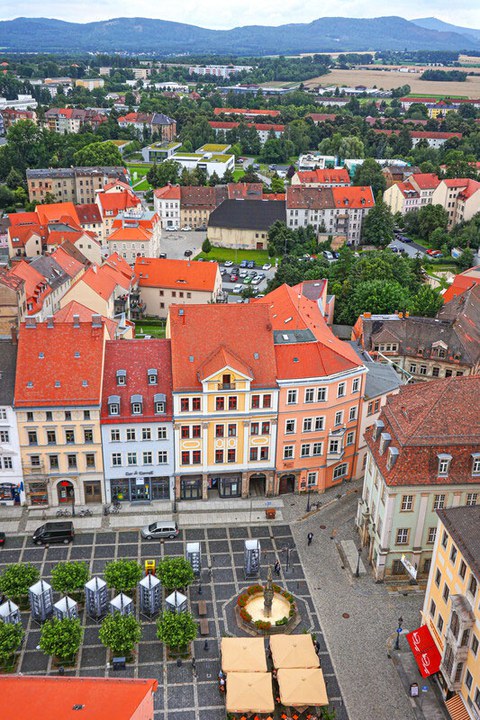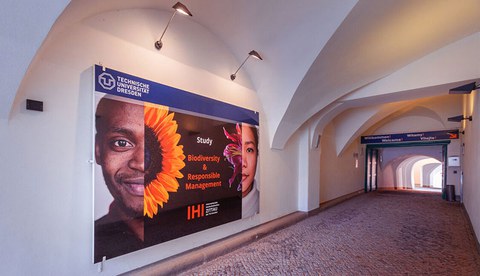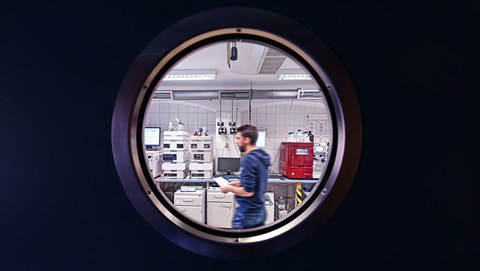Jun 30, 2023
From experiment to stable organism
Dagmar Möbius
“Oh, you're from the engineering school...” This is the most common misconception that Oliver Tettenborn has to clarify on a regular basis – even 30 years after the foundation of the International Institute Zittau. “Although historically, we are a ‘child’ of today's Zittau/Görlitz University of Applied Sciences, we have always been independent," says the Director's Academic Assistant. The IHI has been a Central Academic Unit of TU Dresden since 2013.

Small and excellent at the same time: Located on Zittau's market square, the IHI houses everything in one building.
In 1993, five universities from Saxony, Poland and the Czech Republic founded a model project for joint cross-border learning. Even prior to the Bologna reform, the IHI established advanced degree programs. The first of them was the Diplom program in “Environmental Engineering”, followed by “Business Administration”, “Industrial Engineering” and “Social Sciences.” Starting in 2007, all degree programs were converted to Master's degrees: “Environmental Engineering” became “Biotechnology and Applied Ecology,” “Business Administration” became “International Management,” “Industrial Engineering” became “Project Management,” and “Social Sciences” evolved into “Business Ethics and CSR Management.” You can also do your doctorate at IHI Zittau – nowadays through second memberships of the professorships at TUD faculties. You can read more about important milestones of the IHI history online.
International, compact, and responsible
“In the founding phase of the IHI, teaching was very much shaped towards ecology due to the civil movement in Lusatia,” Oliver Tettenborn recounts. To this day, IHI sees itself as an international graduate school with a family feel. The institute has eleven Chairs, four of them in cooperation with institutions of the Leibniz Association. After its integration into TU Dresden, the institute has set its profile under the motto “Biodiversity and Responsible Management”. In cooperation with non-university partners (Senckenberg and IÖR) and partner faculties within TU Dresden (Environmental Sciences, Economics and Biology), teaching and research are focused on ecosystem services, sustainability and their management.

Entrance area of the IHI Zittau
The IHI has 5 Master’s degree programs:
- Biotechnology and Applied Ecology
- Business Ethics and Responsible Management
- Ecosystem Services
- International Management
- Organismic and Molecular Biodiversity
Around 300 students are enrolled in these Master's programs. They come from around 40 nations on four continents. “Only Australia is missing so far,” Oliver Tettenborn smiles. With a degree in Slavic studies and philosophy, he found what he was looking for in his career in the border triangle area where Germany, Poland and the Czech Republic meet. He has been working at the IHI since 2009 and enthuses: “This is a truly European region.”
English-language Master's programs are very popular
Professor Thorsten Claus has headed the Chair of Production Economy and Information Technology since 2005. Since 2014, he has been the Director of the International Institute Zittau. His management staff praise him for his constructive and positive approach to shape the integration process into TU Dresden. “The English-language ecological degree programs are very popular and have developed a completely new dynamic,” Claus is pleased to say. The IHI does not have to complain about too few students: While “Business Ethics and Responsible Management” is aimed at a very specific but stable target group, attracting 15 to 20 students per enrollment, the “Organismic and Molecular Biodiversity” program is characterized by a Chair that is exceptionally strong in research. “So far, we did not have to turn down any applications for capacity reasons, but we did so for aptitude reasons,” says Oliver Tettenborn. There are no admission restrictions for any of the degree programs. If demand continues unabated, this could change for the “Ecosystem Services” program in the near future.
Double degrees score well
The “International Management” degree program is also enjoying growing popularity, thanks in part to the double degree option: Since the 2019/20 academic year, students can earn a double degree: By spending semesters abroad at the University of Economics in Wrocław, Andrássy University in Budapest or the University of Pardubice, they earn two diplomas. A special version of the double degree is offered by the Central European Campus Neisse/Nisa with TU Liberec, which was launched in 2020/21. The train ride between Zittau and the Czech university city takes only a little more than half an hour. “The courses can be put together very flexibly at two locations in two countries: If I want to take the Controlling module in Liberec on Wednesdays, I can do that without having to move for it,” says the Academic Assistant of the IHI Director, giving an example.

View into an IHI laboratory.
Vanished skepticism and a future
The fact that in 2013 not everyone at the IHI was enthusiastic about becoming part of TU Dresden is understandable. After all, the University of Excellence is much larger than the institute in Upper Lusatia. “It was a political decision,” says Oliver Tettenborn, responsible for public relations at the time. The decision was: “We'll make the best of it.” It wasn't all that easy, he admits. But it wasn't just the students who benefited a lot from the development: “As a Central Unit, we appear in all publications and in the university system.” The initial skepticism has long since disappeared. “The experiment has become a stable organism.”
Nevertheless, there won't be any major celebration on the occasion of the IHI's 30th anniversary. “We are putting a little less energy into it than we did for the demanding week of celebrations for the 20th anniversary ten years ago, which also marked the integration into TU Dresden, or for the 25th anniversary in 2018,” admits Tettenborn. As part of the welcoming ceremony for the newly enrolled students in Zittau's town hall, the institute's history will be recalled and its network presented. “There have been many new appointments in recent years, and we now have to reorganize ourselves as a team,” says Director Claus, explaining the reticence. And he adds: “Above all: After all the retrospectives, we are now rather looking to the future, with all our new staff.”
Contact:
TUD Dresden University of Technology
International Institute Zittau
Academic Assistant of the Director
Oliver Tettenborn
Tel.: +49 3583 612-4001
